Marcus is a firm believer that the customer is not number one. “They’re number two, right behind the employee.” So if you want to be a great business owner, not just a good one, you must care for your employees. Bosses need to promote a culture of safety and protection at all costs if they want their team to succeed. If you compare your business to an organized event, even something as simple as a foot race needs rules, order, and structure. Without those systems in place, it’s chaos. If you’re unsure how your business can help your team feel secure, organized, and protected, here’s your game plan for taking care of your employees.
Is Employee Well Being That Important?
A cared-for employee is a happy one. A study from Oxford University’s Saïd Business School found that employee happiness directly connects with productivity. How directly, you might ask? A happy employee is a whopping 13 percent more productive than an unhappy one. (Stillman, 2019). This positive energy flows to customers too.
“If the employee is happy, then the chances of the customer being happy are exponentially better,” says Marcus. If that’s not an incentive to take care of employees, nothing is. People are most satisfied in their jobs when they have high morale, an excellent team to work with, and a boss who goes above and beyond; so it’s your job to keep the good times rolling.
What Will my Care do For my Team?
A safe, protected work environment can also help your employees sleep better at home, stay fit, not take unnecessary sick days, and feel mentally fresh day in and day out. In other words, it’s a win-win situation for everyone involved. Taking care of your employees will make coming into the office every day something to look forward to, from the new-hires on the bottom rung all the way up to your management team and partners. When you take care of employees by doing something as small as recognizing their hard work, they will want to stay at their jobs longer. Glassdoor, an employer review site, has found that more than half of employees would stay at their jobs longer if their bosses showed them more appreciation. Also, an astounding 81 percent of employees said they were motivated to work harder when their boss showed appreciation for their work. (Glassdoor, 2013).
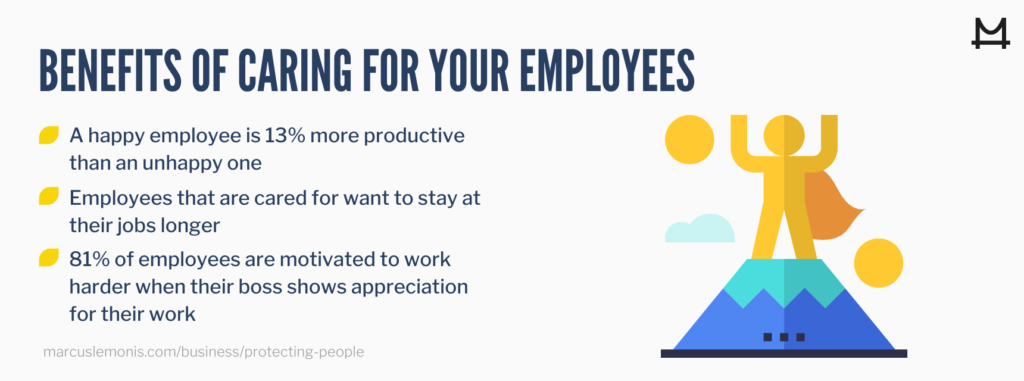
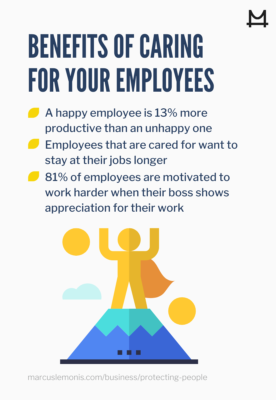
What Steps Can I Take to Show I Care?
Here are five steps you can take to take care of employees:
1. Here’s Some Food For Thought
Something as simple as supplying free bagels on Monday mornings can motivate your employees for the rest of their week. You don’t have to go as far as Twitter’s headquarters in San Francisco where they offer free breakfast, lunch, and complimentary snacks on every floor. (Canales, 2018). But offering some nosh to your staff will motivate them to work harder, and it will make your office a happier environment. This is one of the easiest methods of taking care of your employees and by far the most delicious.

2. Be a Team Player
It’s sometimes hard to give directions without seeming like you are lording over everyone, but it is possible. Even when you’re knee-deep in work and need something done immediately, there are ways to take care of employees while also expressing exactly what you need them to do. Explaining why you need something done in a specific way can help employees see why they might have to put in a little extra work. You can also take time to ask a staff member if anything is holding them back and then implement their changes. That’s what a team player does. If you find yourself sounding too commanding, you can give directions in the form of a polite question.
3. Help Your Employees Grow, Grow, Grow
When you hire someone, you should already see their potential. As the boss, it’s your responsibility to help them achieve what they are capable of. To help you achieve this, you can have employees shadow more experienced staff. Introduce them to people in their field whom you respect or admire. Or, you can assign them tasks just outside of their comfort zone so they can broaden their skills. All of these are examples of taking care of your employees. Another way is to give them “skin in the game,” as Marcus says. When he visited a small, South Florida pie company, Marcus quickly realized one of their key employees was way undervalued and underpaid. The employee had been with the company for years, and was an office assistant who was doing everything from ordering inventory and staffing to human resources and handling employee and customer issues. Her dedication, passion, skill sets, and work ethic eventually earned her a piece of the pie, so to speak, when Marcus gave her equity in the company.

4. Let’s Take This Outside
No matter how many plants or flowers you have in your office, a breath of fresh air will invigorate anybody. By setting aside some time for a change of scenery, you can take care of employees by motivating them to bond outside of the everyday workplace. That will help them see each other as something other than a cubicle mate. For example, outdoor terraces separate the floors in Samsung’s San Jose office building. Employees use them to get to other departments and also to take breaks, enjoy a breeze or sunshine, or to hang out with their coworkers. (Wainwright, 2017).
5. Make Your Praises Public and Your Disapprovals Private
Shame and fear are not good motivators, but recognition and approval are. When you bring attention to individual or team successes, you are taking care of your employees. A floor full of smiling, admiring faces makes their wins seem more significant. This key lesson was something that Marcus tried to instill upon the founder of a high-end dog boarding business in California. With a little constructive feedback from Marcus, the owner came to realize that barking orders and belittling employees in public does nothing to increase morale. Fact is, any negative things you say to your employees will seem much harsher and humiliating than you may have intended it to be if there’s an audience watching. When frank conversations need to be had, think positively, constructively, and consider what you’re saying, as well as when and where you’re saying it.
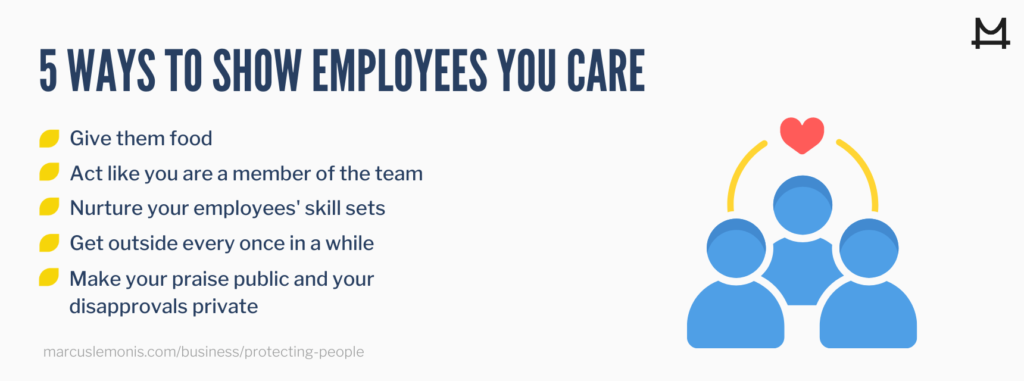
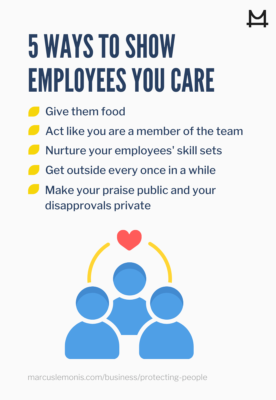
What Should I not do?
1. Don’t Play the Gossip Game
Transparency in business is an excellent way to get rid of rumors, half-truths, and outright lies. Still, when someone has a secret, it’s a secret for a reason. Enacting a zero-tolerance rule for gossip is a good way to keep your employees feeling safe and secure in their workplace, and it’s an example of how to take care of employees who may be going through something in their home life that they don’t want to discuss with coworkers.

2. Was That a Warning Flag?
When an employee starts missing deadlines, they could be going through something at home. Or, they may need some advice on how to manage their workload. You won’t know unless you pay attention. Employees displaying low morale can be a sign that something is off in your corporate culture. In addition to asking questions, genuinely caring about your employees’ personal lives, and making the office a friendly place, you should let your staff know that you are available to talk about serious issues at any time. As a good manager, you should know that taking care of your employees sometimes can’t be scheduled ahead of time.
3. You’re the Face of Your Company
You can take care of employees by merely being a good example. “A successful business owner subscribes to one theory: They show up first, and they leave last,” says Marcus. It’s true. Your actions are just as important as your words. So put on a smile, hand out free compliments, and let today’s issues roll off your back while making a plan of how to handle them tomorrow. How you solve problems is how your employees will solve them too. If you curse and shout, you’ll hear the same thing coming from your sales or marketing team. While you focus on taking care of your employees, make sure you also manage how you present yourself to the world.
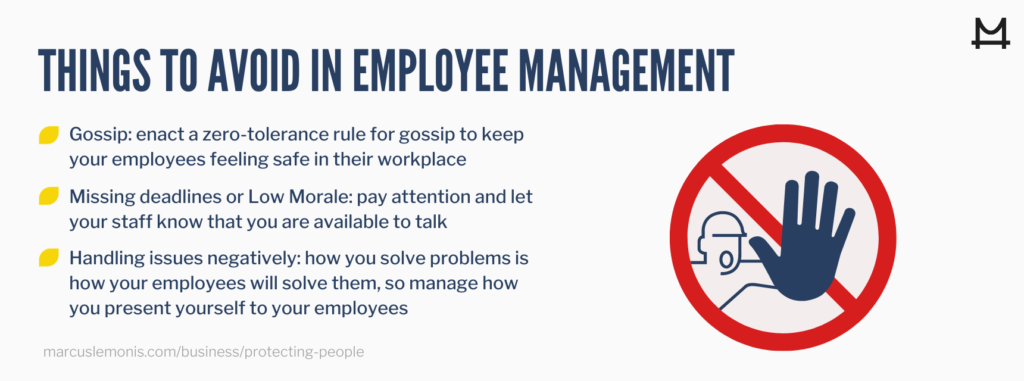
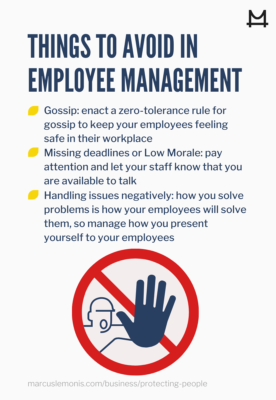
Your Most Important Job
You are the head mentor in your business. The buck stops at your desk. Toxic or unhappy employees will drag down your whole team, so your priority should be to ensure your office stays healthy and protected. When an energy drain occurs in your organization, it can quickly ruin morale and performance. As you plan out your days or weeks on the calendar, make sure you prioritize taking care of your employees through recognition, communication, and development.

As an entrepreneur, you may dream of conquering the business world or creating the best products in your industry. Those dreams are lovely and achievable if you have the drive and determination, but you should also value being seen as the best boss in the world by your staff. On a daily basis, you should take care of employees with the same passion you have for making sales. You fund, organize, and manage your team, but your employees are the ones who will take you across the finish line. Like Marcus says, “Surround yourself with good people.” Then protect them. Nurture them. Mentor them. Help them grow. That’s how bosses and businesses flourish.
- What are some things you currently do in your business to take care of employees?
- Are there any tips from this article that you can use in your business currently to better take care of employees?
Stillman, J. (2019, November 6). New Oxford research confirms it: happy workers are 13 percent more productive. Retrieved from https://www.inc.com/jessica-stillman/new-oxford-research-confirms-it-happy-workers-are-13-percent-more-productive.html
Glassdoor. (2013, November 13). Employers to retain half of their employees longer if bosses showed more appreciation. Retrieved from https://www.glassdoor.com/employers/blog/employers-to-retain-half-of-their-employees-longer-if-bosses-showed-more-appreciation-glassdoor-survey/
Canales, K. (2018, July 31). Cayenne pepper ginger shots, homemade lemon tarts, and Michelin-starred chefs — here’s what employees at Silicon Valley’s biggest tech companies are offered for free. Retrieved from https://www.businessinsider.com/free-food-silicon-valley-tech-employees-apple-google-facebook-2018-7
Wainwright, O. (2017, March 10). On the treadmill. Retrieved from https://www.ribaj.com/culture/on-the-treadmill





